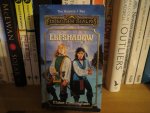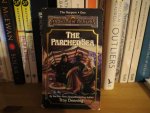#052 Elfshadow by Elaine Cunningham (Harpers 2 + Songs & Swords 1)
Read 19/2/20 to 22/2/20

Book 2 (Harpers) and here's the thing, I guessed which way it was going to go about fifty pages in, it also very quickly became apparent that this one was going to be a talkie- lots of chatter and much less action, and at the end of it all we we're going to be unmasking an assassin. An assassin of Harpers, as opposed to a Harper assassin- the distinction is very important. Anyway, as I was saying- I guessed the bad guy too soon, and there was nothing as I read on that came to pass that made me think any different- other fish swam bye but they were all red herrings. This fact obviously took a little of the edge off the slow unfurling of the plot- which goes on a bit, let me tell you. I don't want you to think I'm a wannabe Sherlock Holmes- an Elf wandered into the narrative, said some things that were a bit off (odd, maybe) and I just got spooked, and then a light went on in my brain and said- 'that's the bad guy', and so it proved.
I even half-guessed the Moonblade, it's in the title of the novel.
So, there's Arilyn Moonblade- a sometime berserk (odd, does she have a level of Barbarian?) Half-Elf swordswoman, equipped with a fabled Moonblade (a super-enchanted (and more) ancient Elven blade). She's sent hunting for an assassin that is assassinating Harpers, Arilyn is an ex-assassin herself who sometimes contracts out (through her boss/mentor Kymil) to the Harpers, mostly retrieving lost things.
Danilo Thann is rakish, noble, half-hearted bard and foppish dandy; actually all of that's a charade- he's Khelben Blackstaff's fave nephew, and potential heir to the archmage of Waterdeep's power. Actually, what Danilo really is, is the best character in the book, he gets the best lines- the best insights, and he generally hefts around the story (and plot) when Arilyn gets in a temper/mood.
The odd couple are forced together- to fight crime and solve the riddle, who is killing Harpers, and why? Although, and this is one of the sticking points for me, there's not much action in it at all, and the fights are wholly disappointing. The finale (I hesitate to use the word) in which Arilyn battles the (sorta) assassin is unbelievably disappointing, by which I mean I like a bit of red, a bit of gore- some terror and last gasp whatever. But the melee's here (for the most part) are of the non-visceral variety, I'm not sure I should castigate myself for wanting my pound of bloody flesh, but... nah. The fighting is very disappointing.
The majority of the story is therefore spent running around Waterdeep in conversation with a number of shady (and otherwise) characters- the best of whom are Khelben Blackstaff (just 'cos he's way better than Elminster), and Elaith Craulnober (the Serpent) who sends Tony Soprano out to get him Caw-fee.
The oddity with the Serpent is his name- is there a way of saying Craulnober (Crawl-no-barr or Crawl-nob-err) that makes him sound less like a venereal disease?
So, there's plenty of bad guys, and shady folk in the mix- including another Harper who vied with the Serpent and won Arilyn's mother's love- so, we get a family reunion. It's that kind of book, even when you unpick the plot there's a mile of other stuff in here, intrigue upon intrigue.
Obviously its also one of those novels in which if everyone just told our heroes what they know right at the beginning, then... well, it'd be a much thinner book. But that's just what whodunnit's do, sorta.
So, two-hundred or so pages of he did this, and she did that, a slow sifting of the dirt to uncover present/historical truths, and if you've not figured it out with a hundred pages to go then you need to sit closer to the teacher.
Even Arilyn has figured it out a hundred or so pages before the end.
There's good stuff in here- Waterdeep and its environs is well observed, as are some of the characters that live here. There's a nice Elf super-race (think white supremacy) thing to admire, but I've always had the feeling that Elves are like that, to good to be... well, good.
There are however plenty of things to keep the reader racing on, I devoured the novel (but mostly for the scenery on reflection) in only a few days. But here's the thing- the Harpers come out of this one looking pretty shambolic, and having had their problems fixed for them- giving the heroes badges after the finale doesn't disguise the fact that the Harpers as portrayed are haphazard, at best. At worst they are a liability- for information gatherers they rely awfully on others, and as they're so disjointed the left hand doesn't know (or seemingly care) what the right hand is doing.
It's odd that Arilyn and Danilo scoot around town asking the villains pointed questions to their faces, while the Harpers (without as much as a hello to Arilyn) decide she's the assassin. I'm at book two in the Harper series and I think they're, well... idiots. That's probably not right.
Oddly, this kind of Harper fault has been highlighted before in other novels- Finder's Stone Trilogy & Avatar Series (I think).
Read.




